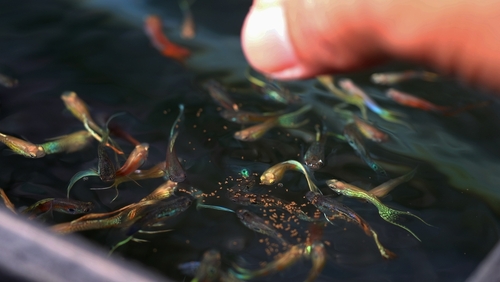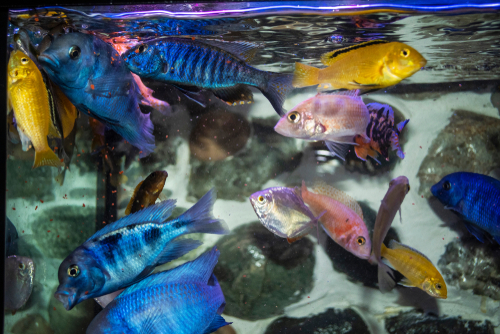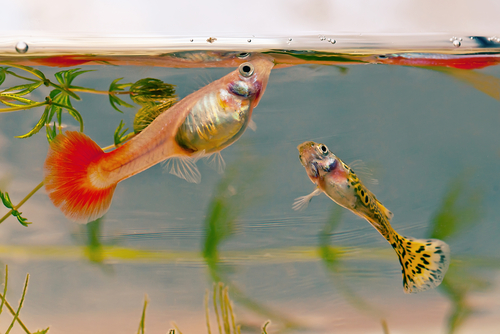Guppy owners often wonder if they can simplify their fish feeding routines by sharing the same food between different species, particularly when it comes to feeding guppies with betta food.
Addressing this question is important for the health and well-being of guppies, as their dietary needs are specific and must be met for them to thrive. Guppies are omnivorous creatures that require a blend of both plant and animal-based nutrients to maintain balanced health.
Betta food, while convenient for those who keep both guppies and bettas, is formulated specifically for the carnivorous diet of betta fish which necessitates a high protein content. On the flip side, guppies also need plant material in their diet for optimal health.
It’s crucial to assess whether betta food can meet the complete nutritional needs of guppies or if its long-term use might lead to dietary deficiencies or health issues. Consequently, understanding the dietary requirements of guppies alongside the composition of betta food helps in determining the suitableness of such a diet for guppies.
Contents
Key Takeaways on Can Guppies Eat Betta Food
- Guppies have specific dietary requirements that differ from bettas.
- Betta food may not provide a complete diet for guppies.
- A balanced diet is essential for the health of guppies.
Check out these other most sought posts on this category:
- Can Shrimp Live with Betta Fish?
- Neon Tetras with Betta: Can They Coexist Peacefully in Your Aquarium?
- Will a Betta Kill a Pleco?
Understanding Guppy Dietary Requirements
Before diving into the specifics of what guppies need for a healthy diet, it’s important to recognize that their requirements are unique and necessitate a blend of both plant and animal-based nutrients for optimal health.
Nutritional Needs of Guppies
Guppies require a variety of nutrients to maintain good health. As omnivores, their diet needs to consist of both plant and animal matter to ensure they receive a balanced diet.
The primary component of their nutrition should be protein, which is essential for their growth and tissue repair. However, it’s crucial not to overfeed protein as it can lead to obesity and associated health problems.
- Proteins: Vital for muscle and fin development.
- Carbohydrates: Needed in smaller amounts for energy.
- Fats: Important for energy and growth but should be limited to prevent obesity.
- Vitamins and Minerals: Essential for immune system health and preventing digestive issues.
Guppy Growth and Development
The growth and development of guppies centers around providing them with a well-balanced diet that promotes healthy maturation. Nutrition significantly impacts their vitality, coloration, and overall well being.
- Balance is key: Too much protein can be as detrimental as too little. An imbalance may cause nutrient deficiencies or digestive issues.
- Regular feeding: Offer small amounts several times a day to ensure they can digest and utilize the food properly, reducing waste and the risk of tank contamination.
- Varied diet: It should include high-quality flake food, freeze-dried, or live foods to mimic the diverse diet they would encounter in their natural habitat.
Exploring Betta Food Composition

In assessing betta food, it’s important to consider the specific dietary needs of betta fish. Such foods are formulated to meet the carnivorous diet of betta fish, which is predominantly protein-rich.
Protein Content in Betta Food
Betta food is designed with a high protein content to cater to the carnivorous nature of bettas. Pellets and flakes specifically made for betta fish often include significant amounts of fish or shrimp meals and other meat-based ingredients.
These components ensure that betta fish receive the necessary protein to support their bodily functions and maintain good health. The protein levels in betta food are typically higher than those found in foods designed for omnivorous fish.
Comparison with Guppy Food
When compared to guppy food, betta food is far more protein-rich, whereas guppies require a balanced diet that includes both meat-based food and plant matter. It’s worth noting that although guppies can consume betta food, it should not be their main food source.
Betta pellets also include a range of vitamins and minerals to support their overall well-being. However, because guppies have different nutritional requirements, it’s essential they get a diverse diet to avoid deficiencies and promote optimal health.
Safety of Betta Food for Guppies
When considering betta food for guppies, it’s essential to evaluate potential risks and how well the guppy digestive system can adapt to a different diet.
Potential Risks and Allergens
Betta food often contains higher protein and fat levels, which might not align with the nutritional needs of guppies. Guppies are omnivorous and require a balanced diet of both plant and animal matter.
Excessive proteins and fats can lead to digestive issues and obesity. It’s also crucial to look for any allergens that might be present in betta food which can cause adverse reactions in guppies.
- Stress and Aggression: A diet not suited to their nutritional needs can lead to stress, which might increase aggression amongst guppies.
- Bacteria and Parasites: Uneaten or over-consumed betta food could spoil and contribute to bacteria or parasite growth in the tank environment, potentially harming the guppy population.
Adaptability of Guppy Digestive System
The guppy digestive system can handle varied diets, but betta food might not provide all necessary nutrients. Guppies need both animal and plant-based food components, and while they can consume betta food, it should not replace their typical balanced diet.
Over time, relying solely on betta food can lead to nutritional deficiencies and health problems.
- Proper Digestion: Betta food might be too dense or rich for guppies resulting in bloating or constipation.
- Nutritional Balance: Regular guppy food contains a balance of vitamins and minerals that might be lacking in betta-specific formulations.
Feeding Guppies Betta Food
When considering feedings for guppies, understanding the potential of betta food as a supplement in their diet is crucial. It’s important to gauge both the frequency and the quantity, as well as to ensure variety in their diet to maintain optimal health for the guppies.
Frequency and Quantity Considerations
Betta food, primarily in the form of pellets or flakes, can indeed be fed to guppies. However, my advice is to administer this as an occasional treat rather than a staple in their diet. Betta food is high in protein, which is suitable for bettas that are largely carnivorous, but guppies require a more balanced diet.
I recommend feeding them betta food no more than once or twice a week and in small quantities to prevent overfeeding. For guppy fry, it’s especially crucial to provide finely ground food to accommodate their tiny mouths.
Variety in the Guppy Diet
What guppies truly thrive on is a varied diet that satisfies their omnivorous needs. In addition to sparingly offered betta food, include a mix of live foods, frozen foods, and freeze-dried options to enrich their diet. Foods like brine shrimp or daphnia offer excellent nutrients that guppies require.
Live and frozen foods stimulate natural feeding behaviors and provide essential nutrition that helps in the vibrant growth and health of your guppies.
An occasional indulgence in high-protein betta pellets or flakes can be beneficial, but it’s imperative to balance it with other food sources to prevent dietary deficiencies.
Impact on Guppy Health and Behavior
In my experience keeping these small, active fish, the type of food guppies consume can have a significant impact on both their physical health and their behavior. Choosing the right diet is crucial for their well-being.
Nutrition and Immune System
Guppies require a balanced diet that caters to their omnivorous nature, which should include both plant and animal matter. Betta food, which is high in protein and designed for carnivorous fish, can disrupt this balance.
Guppies fed exclusively on betta food may face health issues such as obesity and related stress on their bodies. A varied diet supports a strong immune system, while deficiencies can lead to increased susceptibility to diseases. Vitamins such as Vitamin C are essential for enhancing their immune system.
Behavioral Changes
Dietary imbalances can lead to behavioral changes in guppies. Aggression, normally not a trait associated with these peaceful fish, may increase when their diet is not meeting their needs.
Guppies that are overfed or consuming inappropriate food can exhibit signs of stress, and as a result, their overall well-being is compromised. A suitable diet contributes to a more relaxed and natural behavior in guppies, allowing them to thrive in a community setting.
Aquarium Management for Mixed Diets

When managing an aquarium where guppies and bettas coexist, ensure to create a balanced environment that meets the dietary needs of both species. It’s crucial to understand their specific requirements to maintain a harmonious community tank.
Creating a Harmonious Environment
For a community tank housing both bettas and guppies, prioritize the setup to prevent territorial disputes which are common with bettas known for their aggressive behavior.
Here are steps I follow:
- Plenty of Hiding Spaces: I add plants and decorations to allow guppies to hide if they need to.
- Spacious Tank: I recommend a tank size that gives enough room for each fish to establish its territory to prevent stress and aggression.
Monitoring Food Consumption
To monitor food consumption in a tank with guppies and bettas:
- Varied Diet: Provide a mix of foods suitable for both bettas, who are primarily carnivorous, and guppies, who are omnivorous. This approach often involves offering high-protein betta food in moderation, alongside a balanced diet for guppies. For more insights, understanding how guppies can eat betta food clarifies the nuances of this practice.
- Observation: With every feeding, watch how the fish consume their meals, ensuring that both species have access to their food without one outcompeting the other.
Alternative Dietary Options
When considering the dietary needs of guppies, it’s important to provide a mix of nutritional alternatives that cater to their omnivorous nature. Here are some specific alternative diet options I provide to my guppies.
Plant-Based and Live Food Alternatives
Plant-Based Food: Offer guppies various types of vegetables such as blanched spinach, lettuce, cucumber, and zucchini. These vegetables are not only nutritious but also help to replicate their natural diet. Additionally, algae, an essential component in a guppy’s diet, can be included either by cultivating it in the tank or by providing algae wafers.
Live Food: For a more protein-rich diet, live food options like daphnia, bloodworms, and mosquito larvae serve as excellent alternatives. It’s crucial to feed these sparingly since an overdose of protein can lead to health issues. Ensure that any live food you offer is clean and free from disease to prevent any health complications for my guppies.
Homemade Guppy Food Recipes
Creating homemade food gives me control over what goes into my guppies’ diet. A simple recipe I use includes a mix of pureed vegetables, such as carrots and peas, blended with the animal-based component like bloodworms or brine shrimp.
Another option I prepare is a gel food using pureed vegetables and unflavored gelatin as a binder. For added nutrition, I occasionally mix in a pinch of spirulina powder or crushed egg yolk.
In my experience, alternating these foods with high-quality flake food ensures my guppies receive all the necessary nutrients they need to thrive. By paying close attention to the variety and balance in their diet, I can promote the good health and vibrant colors of my guppy fish.
Frequently Asked Questions
What constitutes a well-balanced diet for guppies?
A well-balanced diet for guppies includes a mix of both plant and animal-based foods.They thrive on a diet that includes high-quality flake foods, frozen or live brine shrimp, daphnia, and occasionally vegetable matter.
Are guppy pellets a suitable sole food source for guppies?
While guppy pellets are formulated to provide balanced nutrition, I recommend supplementing them with a variety of other foods. This approach ensures that guppies receive all the necessary nutrients and also prevents dietary deficiencies.
Is it safe for guppies to consume foods formulated for other fish species like mollies or tetras?
Yes, guppies can safely consume foods formulated for similar fish species such as mollies or tetras. However, always ensure these foods meet the dietary requirements specific to guppies’ omnivorous needs.
Can betta flakes or pellets be used as an occasional food for guppies?
Betta flakes or pellets can be used as an occasional treat for guppies. These FISH are often high in protein and can be a good supplement to their diet, as long as it’s given in moderation.
What alternative foods can guppies have if their standard food is unavailable?
In times when standard food is scarce, I’ve fed my guppies various alternatives like boiled vegetables, such as lettuce or zucchini, and even homemade gel food mixes to keep them healthy.
What types of live foods are appropriate for guppies to eat?
Live foods to give guppies include brine shrimp, bloodworms, and micro worms. These live foods are excellent sources of protein and can enhance the guppies’ growth and vitality.

Ian Sterling, founder of Fishlab.com, began his aquarium journey over 30 years ago, driven by a deep fascination for fish and their diverse personalities. His website, Fishlab.com, is dedicated to making fishkeeping accessible and enjoyable, offering beginner-friendly guidance, expert insights, and a community for aquarists to connect and share experiences.


